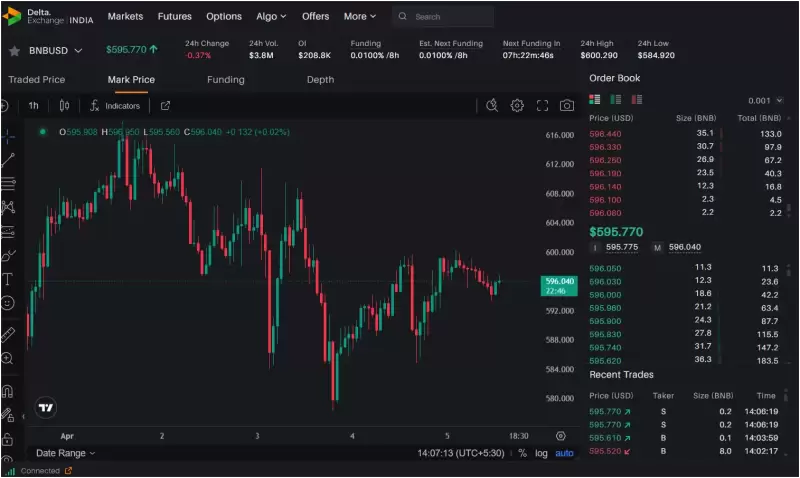 |
|
 |
|
 |
|
 |
|
 |
|
 |
|
 |
|
 |
|
 |
|
 |
|
 |
|
 |
|
 |
|
 |
|
 |
|
Cryptocurrency News Articles
TLDR: China's Move to Allow the Yuan to Depreciate Could Trigger Capital Flight into Bitcoin
Apr 08, 2025 at 03:21 pm
China's recent move to allow the yuan to depreciate past a key threshold could trigger capital flight into Bitcoin, according to industry experts.
China's move to allow the yuan to depreciate past a key threshold could trigger capital flight into Bitcoin, according to industry experts.
The People’s Bank of China (PBOC) set its daily yuan fix at 7.2038 per dollar on Tuesday, the weakest level since September, in what appears to be a response to President Donald Trump's aggressive trade tariffs.
This currency adjustment comes amid heightened tensions between the world’s two largest economies. President Trump recently threatened to increase tariffs against China, prompting the Asian nation to state that it “will fight to the end” and deploy countermeasures to defend its interests.
BitMEX founder Arthur Hayes was quick to spot the cryptocurrency implications. “If not the Fed, then the PBOC will give us the Yahtzee ingredients,” Hayes posted on X on Monday.
He was referring to the five factors needed to resume the crypto market bull run, which include the president’s impeachment trial, the Fed pivoting on interest rates, and the PBOC setting its yuan fix above 7.2.
According to Hayes, if the PBOC sets its yuan fix above 7.2, it will be a clear indication that the central bank is allowing the yuan to depreciate freely. This could lead to capital flight into Bitcoin and other cryptocurrencies.
“It worked in 2013, it worked in 2015, it can work in 2025,” Hayes added, noting that when the yuan gets weak, Chinese capital usually flows into BTC.
This pattern was evident in August 2015 when China devalued the yuan by nearly 2% against the US dollar, the largest single-day drop in decades.
The move sparked increased interest in Bitcoin during this period, although analysts debate whether this directly links to the yuan devaluation.
However, a similar occurrence in August 2019 saw the yuan fall below the symbolic 7:1 ratio against the USD, leading to a 20% surge in Bitcoin within the first week of that month.
This observation led some analysts to suggest that Chinese investors were utilizing the cryptocurrency as a hedge against currency weakness.
Ben Zhou, co-founder and CEO of Bybit, also weighed in on X, stating that "China will try to lower RMB to counter the tariff. Historically, whenever RMB drops, a lot of Chinese capital flows into BTC, bullish for BTC."
Despite the historical correlation, China's increasingly harsh stance on cryptocurrencies could pose obstacles to this narrative.
The country has implemented some of the world’s strictest crypto regulations in recent years.
Earlier this year, a new regulation mandated Chinese banks to monitor and report suspicious international transactions, including those involving cryptocurrency.
These measures could make it difficult for local traders to diversify into Bitcoin and other digital assets even during yuan depreciation.
“Since August 2024, the Supreme People’s Court has increased the legal risks for individuals using cryptocurrencies in connection with money laundering, which could easily extend to cases of capital flight,” Markus Thielen, founder of 10x Research, noted in a note to clients on Monday.
The apex court’s stance means local traders may face difficulties when attempting to move capital into Bitcoin. Banks are now obligated to investigate and report risky crypto trades, which may result in financial restrictions and potential blacklisting for traders.
The PBOC’s move signals a shift to a managed depreciation of the yuan. The 7.2 level has long been considered a “harder line in the sand” for the central bank.
While the USD/CNY pair has traded above this level a few times since 2022, it has never established a foothold there.
This strategic currency weakening helps keep China’s exports cheaper and more competitive, potentially offsetting the impact of Trump’s tariffs on Chinese goods.
However, it also creates conditions that have historically driven wealthy Chinese citizens to seek wealth preservation outside government reach.
Crypto asset manager Grayscale previously noted that currency devaluations damage trust in central banks and government financial management, pushing people toward decentralized alternatives like Bitcoin.
This distrust in traditional financial systems often benefits cryptocurrency markets.
Bitcoin is currently trading at $80,253.26, with a market capitalization of $1,592,882,992,461 and a market dominance of 62.56%.
The cryptocurrency's fixed supply strengthens its appeal as a hedge against fiat depreciation, making it a potential beneficiary of China's economic strategies.
Disclaimer:info@kdj.com
The information provided is not trading advice. kdj.com does not assume any responsibility for any investments made based on the information provided in this article. Cryptocurrencies are highly volatile and it is highly recommended that you invest with caution after thorough research!
If you believe that the content used on this website infringes your copyright, please contact us immediately (info@kdj.com) and we will delete it promptly.



























































